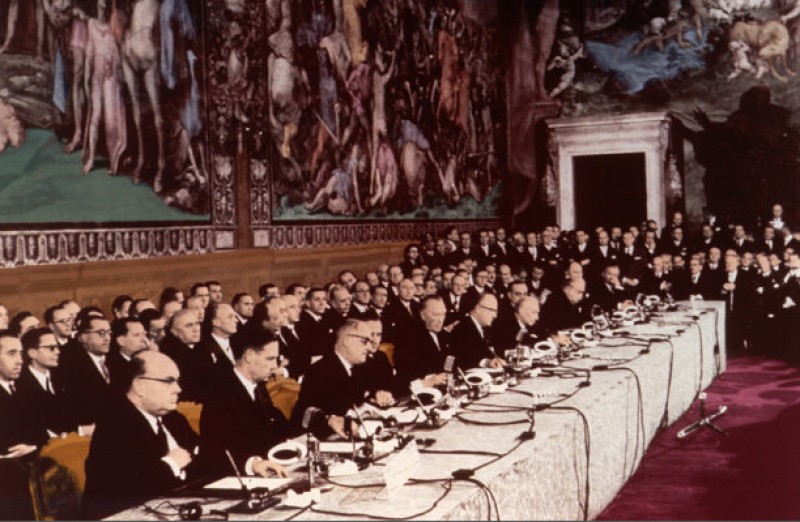Press Release No: 17/06
24 March 2017
Brussels
On 25 March 1957, the Treaty of Rome established the European Economic Community. This was the first of major steps in implementing the Schuman declaration of 1950, which called for the pooling of coal and steel production with the view of creating economic stability and preventing another great war.
The founding of the European Economic Community 60 years ago was a significant decision for its six founding Member States—Belgium, France, Italy, Luxembourg, the Netherlands, and West Germany—in deepening their relationship and commit to cooperation at a European level, which led to the building up of the European Union. The Treaty sought to “lay the foundations of an ever-closer union among the peoples of Europe.”
In the generations since the signing of this historic treaty, Member Churches of the Conference of European Churches have accompanied this process and worked for a Europe characterized by peace, solidarity, and reconciliation. In the post-World War II era, the churches saw European integration as an opportunity for the flourishing of Europe and its people, and to develop a new relationship with the world beyond Europe.
In the era of the Treaty of Rome the Conference of European Churches was born. With its distinctive mission to bridge the divide between East and West cleaved by the Iron Curtain, CEC brought into conversation churches in European countries separated by different political, economic, and social systems.
Today, the achievements brought about by this impetus are at stake. Europe is confronted with multiple crises and confidence in the European project is eroding. The European Union, and our continent as a whole, needs courageous decisions and a renewed orientation to its future as a peace project and community of values. In this spirit, the Conference of European Churches launched a broad process reflection with its Member Churches through its open letter “What Future for Europe?” and a series of regional consultations leading to our 15th General Assembly in Novi Sad (Serbia) in 2018.
“While Europe faces challenges relating to mass migration, economic instability, growing Euroscepticism, and outbursts of violence, we must also remember the goods of integration and cooperation,” remarked CEC General Secretary Fr Heikki Huttunen. “The era inaugurated by the Treaty of Rome has brought about freedom of travel, work, and study, and contributed to the overcoming of dictatorships and the promotion of democracy throughout Europe. We must also recall original vision of the founders of social equality throughout the EU as we continue to work for just social and economic conditions for all Europeans.”
Together the churches in Europe are shaping a vision for our common future and in commemorating the historic Treaty of Rome we express again our commitment to a “humane, social and sustainable Europe at peace with itself and its neighbours in which human rights and solidarity prevail.” (CEC Constitution).
Erin Green
Communication Coordinator
Conference of European Churches
Rue Joseph II, 174 B-1000 Brussels
Tel. +32 2 234 68 42
Fax +32 2 231 14 13
E-mail: eeg@cec-kek.be
Website: www.ceceurope.org
Facebook: www.facebook.com/ceceurope
Twitter: @ceceurope
The Conference of European Churches (CEC) is a fellowship of 115 Orthodox, Protestant, Anglican and Old Catholic Churches from all countries of Europe, plus 40 National Councils of Churches and Organisations in Partnership. CEC was founded in 1959. It has offices in Brussels and Strasbourg.
